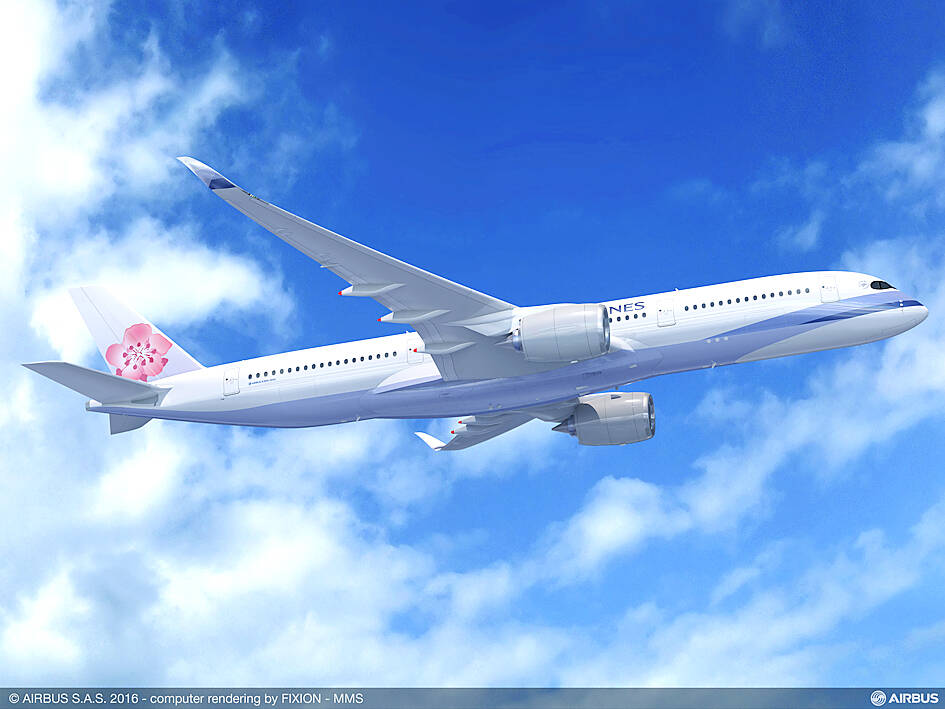The ongoing strike at Boeing Co has had only a minor impact on China Airlines Ltd (CAL, 中華航空), although the delivery of a new cargo jet might be postponed, CAL chairman Hsieh Su-chien (謝世謙) said on Saturday.
The 24 Boeing 787-9 passenger aircraft on order would be delivered on schedule from next year to 2028, while one 777F freight aircraft would be delayed, Hsieh told reporters at a company event.
Boeing, which announced a decision on Friday to cut 17,000 jobs — about one-tenth of its workforce — is facing a strike by 33,000 US west coast workers that has halted production of its 737 MAX, 767 and 777 jets.

Photo courtesy of China Airlines Ltd
The downsizing is necessary “to align with our financial reality,” Boeing chief executive officer Kelly Ortberg said in a message to employees on Friday, as the company also struggles with growing concerns over the quality of its aircraft.
The aviation giant announced a series of belt-tightening measures and production delays as the one-month-long strike of 33,000 workers has added to the company’s litany of problems.
Boeing staff with the International Association of Machinists (IAM) and Aerospace Workers walked off the job on Sept. 13 after overwhelmingly rejecting a contract offer.
The company said the IAM strike contributed to US$3 billion in pre-tax charges to its commercial aviation results in the third quarter, part of an anticipated loss of US$9.97 per share.
Ratings agency S&P estimated last week that the strike was costing Boeing US$1 billion per month.
However, Hsieh said that Boeing has confirmed that the 787-9 production line is unaffected, as its North Charleston, South Carolina facility has no union presence.
CAL has introduced six 777F freighters since December 2020, followed by the purchase of four more in January 2022.
Nine of the aircraft have been delivered so far, but the 10th, originally scheduled for delivery in August this year, has been delayed, with the new timeline yet to be determined, Hsieh said.
CAL’s revenue rose 7.4 percent year-on-year to NT$16.01 billion (US$497.5 million) last month, as its passenger revenue grew 2.41 percent to NT$9.45 billion and cargo revenue also increased 13.42 percent to NT$5.27 billion, the company reported on Friday.
In the third quarter, revenue rose 9.3 percent from a year earlier to NT$52.1 billion, the highest for the July-to-September quarter in the company’s history, it said.
Cumulative revenue in the first three quarters of the year was NT$150.98 billion, up 9.76 percent annually and the highest for the period, company data showed.
Additional reporting by AFP

CAUTIOUS RECOVERY: While the manufacturing sector returned to growth amid the US-China trade truce, firms remain wary as uncertainty clouds the outlook, the CIER said The local manufacturing sector returned to expansion last month, as the official purchasing managers’ index (PMI) rose 2.1 points to 51.0, driven by a temporary easing in US-China trade tensions, the Chung-Hua Institution for Economic Research (CIER, 中華經濟研究院) said yesterday. The PMI gauges the health of the manufacturing industry, with readings above 50 indicating expansion and those below 50 signaling contraction. “Firms are not as pessimistic as they were in April, but they remain far from optimistic,” CIER president Lien Hsien-ming (連賢明) said at a news conference. The full impact of US tariff decisions is unlikely to become clear until later this month

GROWING CONCERN: Some senior Trump administration officials opposed the UAE expansion over fears that another TSMC project could jeopardize its US investment Taiwan Semiconductor Manufacturing Co (TSMC, 台積電) is evaluating building an advanced production facility in the United Arab Emirates (UAE) and has discussed the possibility with officials in US President Donald Trump’s administration, people familiar with the matter said, in a potentially major bet on the Middle East that would only come to fruition with Washington’s approval. The company has had multiple meetings in the past few months with US Special Envoy to the Middle East Steve Witkoff and officials from MGX, an influential investment vehicle overseen by the UAE president’s brother, the people said. The conversations are a continuation of talks that

CHIP DUTIES: TSMC said it voiced its concerns to Washington about tariffs, telling the US commerce department that it wants ‘fair treatment’ to protect its competitiveness Taiwan Semiconductor Manufacturing Co (TSMC, 台積電) yesterday reiterated robust business prospects for this year as strong artificial intelligence (AI) chip demand from Nvidia Corp and other customers would absorb the impacts of US tariffs. “The impact of tariffs would be indirect, as the custom tax is the importers’ responsibility, not the exporters,” TSMC chairman and chief executive officer C.C. Wei (魏哲家) said at the chipmaker’s annual shareholders’ meeting in Hsinchu City. TSMC’s business could be affected if people become reluctant to buy electronics due to inflated prices, Wei said. In addition, the chipmaker has voiced its concern to the US Department of Commerce

STILL LOADED: Last year’s richest person, Quanta Computer Inc chairman Barry Lam, dropped to second place despite an 8 percent increase in his wealth to US$12.6 billion Staff writer, with CNA Daniel Tsai (蔡明忠) and Richard Tsai (蔡明興), the brothers who run Fubon Group (富邦集團), topped the Forbes list of Taiwan’s 50 richest people this year, released on Wednesday in New York. The magazine said that a stronger New Taiwan dollar pushed the combined wealth of Taiwan’s 50 richest people up 13 percent, from US$174 billion to US$197 billion, with 36 of the people on the list seeing their wealth increase. That came as Taiwan’s economy grew 4.6 percent last year, its fastest pace in three years, driven by the strong performance of the semiconductor industry, the magazine said. The Tsai